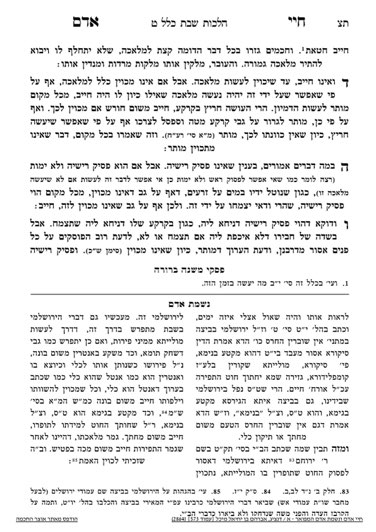We are continuing siman 3, and left off discussing scenarios where one only keeps melachos deoraysa and how that affects the atmosphere of keeping Shabbos. It is a background to the idea we learned from the Rambam and Ramban, that Hashem gave Chazal a mandate to create a Shabbos atmosphere, because when one does not have to keep shevusim, it significantly changes the Shabbos atmosphere. We had learned about the different reasons Chazal instituted their issurim. One was regarding melachos which are similar to issurei deoraysa, such as trapping animals which are not normally trapped or doing melacha with a shinui. Another was because it could lead to an issur deoraysa, such as making business transactions which could lead to writing. The third was uvda d’chol, prohibiting certain actions which are not Shabbos-dik. All three of these categories lead Chazal to institute shevusim.
If a person travels to Hawaii, Japan, New Zealand, and other places in that area, there is a machlokes which day is observed as Shabbos. The Chazon Ish holds that in Japan, one should keep Shabbos on the day which the locals consider Sunday, and according to others, one should keep Shabbos on Saturday.
According to the Chazon Ish, Hawaii should keep Shabbos on Saturday, but according to Rav Yechiel Michel Tukachinsky, they should keep Shabbos on Friday.
Other poskim have opinions on these places as well.
One approach employed by the poskim, including by Rav Moshe Heinemann Shlit”a, is that the day which is considered Shabbos according to the majority of poskim is kept as full Shabbos. On the day which is considered Shabbos according to the minority of poskim, one only keeps issurei deoraysa.
Thus, for example, regarding Hawaii, most poskim consider Shabbos as Saturday, but there is a minority of poskim who hold that Shabbos should be kept on Friday. Therefore, on Friday they keep issurei deoraysa. They can ask non-Jews to do things for them, buy and sell, move muktzah, use money, and perform melacha with a shinui, among other things. Rabbi Reingold’s approach to smartphones is that they are assur miderabanan, so they can even call a rav on Friday to find out if something is assur mideoraysa! This is what Shabbos looked like for Moshe Rabbeinu, and we can clearly get a sense of why Chazal instituted issurei derabanan, in order to generate a feel for Shabbos.
Before the Mir Yeshiva went to Shanghai, they spent six months in Kobe, Japan, which included Yom Kippur. They sent a question to the Chazon Ish regarding which day should be kept as Shabbos (and Yom Kippur), and the Chazon Ish said to keep what the locals call Sunday. Other people were traveling with the Mir, including the Amshinover Rebbe. When the Amshinover sent the question to others, he was told to keep Shabbos on that which the locals call Saturday. Therefore, they decided to keep Shabbos as the regular Shabbos, and to keep issurei deoraysa on Sunday.
Afterwards, Rav Chatzkel Levenstein reflected that keeping Shabbos without issurei derabanan makes it almost impossible to keep the issurei deoraysa, because it is so hard to remember Shabbos. He testified that it took a tremendous amount of mental effort to keep Shabbos in mind when they were putting on tefillin, davening the weekday davening, not making kiddush, and so on, to refrain from picking up a pen and writing. We see the importance of the takanos of Chazal, in order to keep the atmosphere of Shabbos and protect the issurei deoraysa.
Summary
- Issurei derabanan on Shabbos are known as shevus, and stem from Hashem giving Chazal a mandate to engender a Shabbos atmosphere, and more than just protecting a person from transgressing issurei deoraysa.
- Regarding countries which are part of the machlokes of the International Date Line, the accepted psak is to observe full Shabbos on the day which the majority of poskim consider Shabbos, and observe issurei deoraysa on the day which the minority of poskim consider to be Shabbos.



